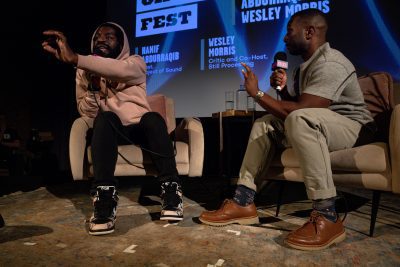Ben Hozie (photo by Carolina Faruolo)
BODEGA makes Art Rock for a ‘Broken’ World
One of the borough’s more exciting rock bands talks about Heidegger, history, and recording a 'thinking party' album during the pandemic

Nikki Belfiglio of Bodega at Market Hotel in 2019 (credit: José Simián)
In the bygone days before Covid, Brooklyn art rock collective Bodega’s bombastic live shows were an irresistible storm of sound, energy and ideas. At the heart of the five-piece ensemble is a real-life couple with an energetic call-and-response dynamic on stage: singer and guitarist Ben Hozie, and vocalist, percussionist and “art director” Nikki Belfiglio.
The band was gaining momentum and word-of-mouth buzz with every performance, and each subsequent album release between 2016 and 2019. The band’s lineup gradually coalesced around the duo and stand-up drummer Tai Lee, bassist Heather Elle and guitarist Madison Velding-Vandam.
If you haven’t heard Bodega —think Talking Heads meets B-52s in 2021 Bushwick—press play on their 2019 concert album “Witness Scroll.” From the automated voices that kick the conceptual party off by commenting on technology and consumerism to their 10-minute version of their proto-punk track “Truth Is Not Punishment” (with nods to Chuck Berry and Bob Dylan), it’s the closest you can get to the quintet’s spirit.
Brooklyn Magazine recently sat down with Hozier and Belfiglio to talk about what they’ve been up to during the pandemic, recording new material, lineup changes, and and how Heidegger inspired their next album through a book club. The following has been edited for clarity and flow.
What have you been up to since the pandemic started?
Nikki Belfiglio: We recorded a new album. We worked since March to put together demos, and in September we went into Trout Recording in Prospect Heights. We brought a bunch of people together and had a two-tier studio, where we were on top quarantining, and the engineer was on the first floor, although eventually things did get mixed because this is how it works. So we recorded 20 songs, we’re going to pair it down to 12-13, and we’re going to put it out this year.
Does the album have a title?
Ben Hozie: Um, yeah. Tentatively. But I don’t know if I should say that. I kind of want to keep it secret.
Well, is there a concept for the album, or something that was different this time around?
Belfiglio: A concept.
Hozie: One of the bigger ideas in the record is that it’s about this current moment as a historical moment, but also as a personal moment, and kind of analyzing how we got here. You know Heidegger’s concept of “thrownness?” You know, we’re all thrown, thrust into a situation, so most of our thoughts are not our own. And trying to analyze it as a rock band: where are our thoughts coming from? So I did some research for the first time in writing songs, reading about New York, the past. Read a bunch of books about New York.
Belfiglio: And philosophy!
Hozie: Yeah, we were reading a lot of continental philosophy. One of the more fun aspects of where the band is at now—which I hadn’t thought about before, but now that I’m talking about it, it’s a big pressing thing—is that we changed some members. Right before quarantine two of our other band members [Heather Elle and Madison Velding-Vandam] decided that they wanted to do their own band—The Wants.
Let’s talk more about that philosophy reading club.
Hozie: So I had a reading group that I’ve been doing for a year and a half now with some friends, a philosophy reading group, and Tai, our drummer, was in it as well. And I remember thinking that it would be great—because we had such a camaraderie—if we could turn our reading group into the band, and eventually it did. So our new bass player is kind of the leader of that group. A lot of the thematics of the album came out of the discussions of that group, so it kind of worked out in a fun way.
Belfiglio: Our new bass player, Adam, is a professor of animal ethics at a college in Newark. It’s definitely become a very intellectual album. Someone asked, “Well, what’s different between the last album and this one?” and we said, “We have a lot in our minds, so there’s more words!” And it’s true!
What philosophers in particular have you been reading?
Hozie: We were reading a lot of the basics of continental existential philosophy. We started with Nietzsche, and we read a lot of Heidegger. I’ve been thinking about the Heidegger concept of “broken equipment,” the idea that something doesn’t really reveal itself to you until it’s broken. The idea that I may not even be aware that I have a toe until I stub it. Art is like that in the sense that it’s damaged and it reveals something, so the world we’re in now is broken and it’s revealing a lot of things to us. I just like the sound of the phrase, it’s evocative.
We started to read a lot of Arendt over the summer. We’ve been trying to read some Deleuze and Guattari. They don’t make it easy to read them!
Belfiglio: Well, neither does Heidegger!
Hozie: Well, sure.
What eras of New York have you been reading about, and how do those connect to continental philosophy and current New York?
Hozie: People always talk about, “New York was authentic at this point, or was authentic at that point.” Like, people talk about who are the natural people that should be living in any one era? And then I kind of stumbled up on my answer: The story of New York was that it was founded by a corporation, founded by essentially the Dutch East India Trading Company, and what’s always made New York interesting is that it was a commerce port for sugar beaver pelts and slaves, unfortunately, in the beginning. And eventually the arts began to flourish here as well, because the arts will follow wherever there’s money and trading. And what has been the story of New York: the relationship between the artistic side and the economic side. When you’re a New York band, wherever you go in the world, people want to talk to you almost as if you’re a cultural ambassador to Manhattan like, “Oh, so you must feel a great connection to Bob Dylan, and the Greenwich Village…”
Belfiglio: And The Velvet Underground.
Hozie: Yeah, The Velvet Underground and Andy Warhol, or CBGBs and The Ramones, and The Strokes, and maybe that’s all true but, you know. But I’m like, “Well, if you really want to know the story of New York, you have to go back a few more centuries.”
Sounds heady for a rock band.
Hozie: Also, I don’t want to give the impression that our record is simply a study or a series of lectures. One of our big goals was to not make a bummer record during quarantine, so it’s all upbeat songs. We wanted it to be like a “thinking party.” It’s a body record. It’s all based around grooves and bass lines and fast beats, but there’s kind of a caffeinated consciousness running through it asking these questions.
Belfiglio: Have you ever seen the Powers of Ten video? It’s from the 1970s. It was made by IBM…
Hozie: It’s extraordinary, and you see this family having a picnic right on the side of Lake Michigan, and it pulls out and out…
Belfiglio: It zooms up and up times the power of 10. It starts with this picnic, and you zoom up and up and up, until you see the solar system, and then out of the solar system, and then it reverses and it comes to the picnic people, and then you go in and in, into the molecular structure. It kind of shows how we approached the album, like it shows us sitting here and talking about how we want to make this album, and then we pulled it back and attacked it from that view, and then we pulled it to the extreme.
You might also like 


























